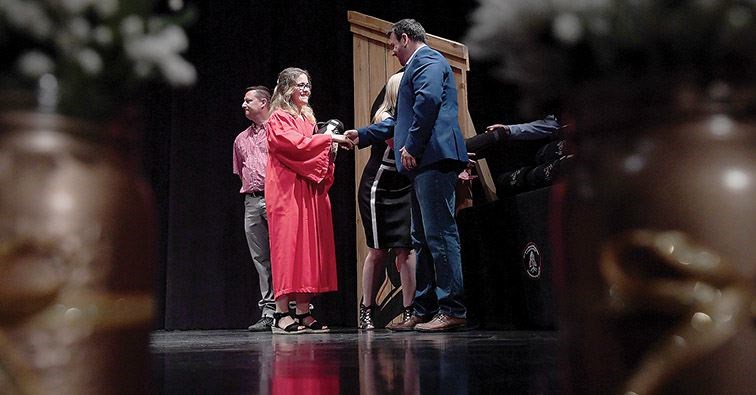Lheidli territory has never been the site of an all-Aboriginal graduation ceremony, until now.
In an historic education event, School District 57 held a special event Thursday at Vanier Hall to celebrate the success of Indigenous students in the mainstream school system.
Statistically, those numbers have traditionally been low, but when the provincial government recognized a few years ago how Aboriginal content in the school curriculum helped connect Aboriginal students to the learning system, plus also helped non-Aboriginal students have a clearer vision of their home communities, the graduations from grade to grade began to notably rise.
Many of the pilot programs that led to the ongoing provincial overhaul of the education system were led by School District 57 (SD57) headquartered in Prince George on Lheidli T'enneh First Nation territory. Thursday's ceremony, putting Indigenous achievement into a cultural context, was another first.
Its title was Ts'udelhti, which in the Lheidli dialect of the Dakelh language, means We Honour.
"Close to 80 graduates will represent 33 nations," said organizers of the event.
"If any individual student does not have a delegate from his or her nation in attendance, that student will be honoured by the Lheidli T'enneh Nation for the day."
The concept of an Aboriginal high school graduation celebration started with Lance Potskin, a SD57 Aboriginal Education worker.
"Other districts are doing it, and I just thought it was time," said Potskin, who made reference to Aboriginal graduation initiatives at the University of Northern British Columbia and the College of New Caledonia.
"I thought it would be a great opportunity for our high school students. I think it's an opportunity for them to embrace where they are in their journey and culture."
Noelle Pepin, an Aboriginal resource teacher with the district, said Ts'udelhti is "one of the first steps" in honouring the cultural identity of Aboriginal graduates.
"Honouring our students' cultural identity will make them stronger learners and feels like we're moving towards reconciliation," Pepin said. "I think it's a step in the right direction. We need to keep building it, and we're picking up speed."
The reaction to Ts'udelhti among graduating Aboriginal students has been positive.
"We've had the opportunity to meet with the youth and some of their families," said Lisa Provencher, who works in SD57's Aboriginal Early Learning Program. "They're excited to see this happen."
Ts'udelhti included a live performance by Juno-nominated musician Marcel Gagnon who was born in Prince George and is a member of the Lheidli T'enneh First Nation.
The Southridge Elementary School Choir also performed. Local student Caitlyn McCarville performed a Jingle Dress dance.
Another significant part of the graduation ceremony was the inclusion of young learners from the Prince George Aboriginal Head Start Program, hosted by the Prince George Native Friendship Center.
"The program is designed to meet the spiritual, emotional, intellectual and physical needs of Aboriginal preschool children (ages three to five) who live in an urban setting," said organizers.
Provencher said, "we wanted to create intergenerational experiences.
The Grade 12 students will honour and gift the Head Start students as a proverbial passing of the torch, saying, 'We're ending this particular journey and you're starting.'"
Graduating student Taylor Peterson made a special address to the Head Start learners, who in turn delivered a pair of performances for grads and guests.
"This group of Head Start children would graduate in 2032, and then they will take on the role of gifting and inspiring the next generation," Provencher said.
All students at the ceremony were given a traditional Lheidli welcome from LTFN Chief Clay Poutney.
"We're trying to strengthen connections between the students and their nation and also their Indigenous identity," Pepin said.



